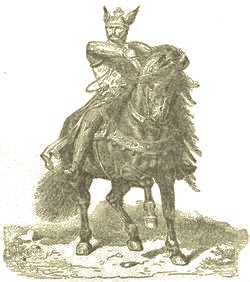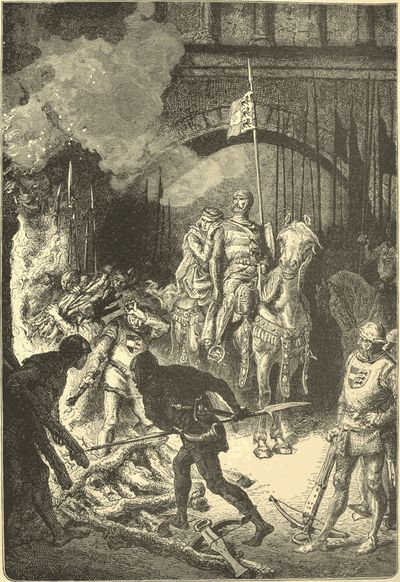
The narratives concerning the life and exploits of the Cid are, to a great extent, merely poetic. Yet it has been wisely said, that much which must be rejected as not fact may still be accepted as truth; that is, there is often to be found under the husks of legend and myth, a sound kernel of historical reality. This may be the case with respect to the Cid, who probably was a warrior so remarkable for genius or bravery above his fellows that he gathered up in a single fame the reputation of many others, with whose deeds he was credited, and whom, as a class, he accordingly represents in history.
Spain, long one of the most flourishing provinces of the Roman Empire, was among the first to fall under the sway of the Visigoths, a warlike but enlightened race, which soon embraced Christianity. For three centuries the country remained under Gothic rule, but fell, in 712, by the invasion of the Arabian conquerors of Africa—a remnant of Christians only preserving an independent monarchy in the mountains of Asturia. This little seed of freedom grew and bore fruit. France proved a formidable barrier against further invasion; and in Spain itself internal jealousies among the Arab families weakened the Moslem and strengthened the Christian power. In the eleventh century there were several states in Spain wholly unfettered by a foreign yoke. The enmity between the two races and creeds was bitter, and war raged perpetually. Yet it often happened that, at the prompting of private revenge or family quarrels, alliances were made between kingdoms thus naturally opposed to each other. A recollection of this fact is essential to a clear understanding of Spanish history at this period.
At the commencement of the eleventh century the chief Christian states of Spain became, through divers marriages, united under one king, Sancho, who died in 1034 dividing his territories among his three sons: of whom Garcia took Navarre, Ferdinand, Castile, and Ramirez, Aragon. Leon, the remaining Christian monarchy, was ruled by Bermudez III., whose sister Ferdinand of Castile had married. Just as this apparent junction of interest occurred among the warriors of the Cross, the greatest confusion prevailed among those of the Crescent. The mighty house of the Ommiades—perhaps the most illustrious of the factions into which the successors of the Prophet were divided—no longer commanded the allegiance of the Arabs of Spain. Its last prince fled, and the chief cities fell into the hands of independent lords, who constituted themselves petty Emirs in their own dominions. Instead, however, of taking full advantage of this state of anarchy to extend their united power, the Christian kings weakened each other by unnatural and deadly quarrels. Ferdinand, King of Castile, seems to have been the principal aggressor. His great captain in his wars, both with Moslem and Christian states, was Rodrigo Laynez, who was called also by the Spaniards Ruy Diaz de Rivar, from the name of his birthplace, and by the Arabs El Sayd (Lord), which has been altered into Cid. He was probably born about the year 1026, or rather later, at the Castle of Rivar, near Burgos, in Old Castile, of a noble but not wealthy family. He joined the army of Ferdinand, and rose by his talents, strength, and courage to the highest place in that king's service. Among the romantic stories told of his early career is one concerning his marriage, which forms the subject of a popular ballad. The father of Rodrigo, having been injured by a Count Gomez, the young knight defied the latter to a duel and slew him. The count's daughter, Ximena, in a storm of grief and rage, flew to the king, and cried for vengeance on Rodrigo, who met her face to face, and awaited the result of her entreaties.
No one, however, was hardy enough to offer himself as the damsel's champion against so doughty a warrior, and Rodrigo calmly retired. His manly bearing and fame won him a place in the very heart which he had so deeply offended; and, with truly Spanish impetuosity, Ximena gave him, not only pardon, but love. She again repaired to the king and asked leave to bestow her hand upon the knight, urging the curious plea that she foresaw he would one day be the most powerful subject in the realm. Informed of this request, of which the king approved, Rodrigo consented to the marriage, as an act of obedience to his sovereign and of justice to the lady. The meeting of this strangely matched pair is thus described in the ballad (Lockhart's translation):
"But when the fair Ximena came forth to plight her hand,
Rodrigo, gazing on her, his face could not command:
He stood, and blushed before her: thus at the last said he,
'I slew thy sire, Ximena, but not in villany:
In no disguise I slew him; man against man I stood;
There was some wrong between us, and I did shed his blood:
I slew a man; I owe a man; fair lady, by God's grace,
An honored husband shalt thou have in thy dead father's place.'"
It is unfortunate that this charming story is supposed to have but little foundation in fact. Many of Rodrigo's legendary exploits are still less authentic; but history and fable unite in declaring him a warrior of no common stamp. His master, King Ferdinand, as we have said, invaded the territories of his brothers and friends, besides those of his enemies. Garcia, Ramirez, and Bermudez successively fell before his attacks, which Rodrigo, in the true spirit of knightly obedience to his lord, did not hesitate to lead. Sancho, the king's eldest son, was Rodrigo's most intimate friend; and on the accession of the prince to his father's throne on the death of Ferdinand, in 1065, Rodrigo became Campeador (or, as the Arabs call him, El Cambitur); that is, head of the army. The new king followed in his father's courses of injustice, and drove his brother, Alfonso, King of Leon, into exile.

The Cid ordering the Execution of Ahmed.
In 1072 Sancho besieged Zamora, which one of his sisters, whom he had likewise despoiled, held out against him. The king was killed during the siege, and, as it was suspected, by the agency of his exiled brother, Alfonso, who succeeded to the throne. Rodrigo felt his friend's death deeply, and did not scruple to avow his suspicions of Alfonso. Before promising allegiance, the Campeador insisted that the king should cleanse himself by an oath of the accusation which popular rumor had brought against him. To this Alfonso, whether innocent or guilty, not unnaturally demurred; but the powerful warrior was firm, and the king at last yielded. When the appointed day arrived, Alfonso made his appearance, surrounded by his courtiers, all obsequiously vying in praise of his glory and virtue, and contemptuous denunciations of his daring accuser. Rodrigo stood alone and gazed on the king sternly. Some of the nobles endeavored to dissuade him from holding this attitude of opposition, and to induce him to forego the demand which he had made; but he put them aside and repeated his challenge. Alfonso dared not refuse to accept, and accordingly recited aloud the form of oath prescribed on such occasions, affirming, in the presence of his maker and the saints of heaven, that he was guiltless of the death of his brother. He had no sooner concluded than all eyes were turned upon the Cid, who, in deep, solemn tones, and with the most impressive earnestness of manner, imprecated on the head of his king every curse that heaven or hell could inflict, if, in taking that oath, he had committed perjury. The awed assembly then broke up. Rodrigo, from that hour, was hated by the king and shunned by the court.
Yet, aware of the Cid's value, Alfonso seems to have concealed his resentment for some time, and even endeavored to win the affection of his great subject by allying him in marriage with one of the royal family. Rodrigo's wife was now dead, and he consented to marry the princess proposed to him, whose name was also Ximena. The marriage took place in 1074. It had not the effect, however, of uniting the king and the Cid. After having achieved a brilliant success over the Arabs of Granada, who were at war with two other Moslem states in alliance with Castile, and having signalized his humanity by releasing all his prisoners, the great Campeador was disgraced and banished by his ungrateful master. At the court of the Emir of Saragossa the exile found a ready welcome, and was appointed to a high post in the government of the kingdom. He did not bear arms against his own sovereign, but headed the Arabs in several battles with the Christians of Aragon and other states. The invasion of a Moorish host in Spain, under the eminent Caliph Jusef Ben Taxfin, chief of the Almoravides and conqueror of Morocco; the rapid subjugation of the independent Emirs, and the defeat of Alfonso's army at the battle of Zalaka, in 1087, recalled the Castilians to a sense of Rodrigo's worth. He was invited to return by Alfonso, and with great generosity consented, bringing with him a large body of men raised by his own exertion and cost. For two years he made his name terrible to the Moors, as the great Christian champion.
But even this fame was not sufficient to secure his influence at court, and about the year 1090 he was once more banished, and his estates were seized. He appears from this time to have commenced a life of adventurous and independent warfare with the Moors. He besieged Alcocer, a strong Moorish fortress on the borders of Aragon, and finally took it. With a band of determined warriors of his own stamp he ravaged, consumed, and spoiled all the Moslem territories which he invaded, making a castle on a rock in Ternel his chief stronghold, and thence sallying out in forays. The place has been ever since called the Rock of the Cid.
The last and greatest achievement of this hero was the taking of Valencia. This city was in the hands of a Moslem prince, Alcadir by name, who had refused to acknowledge the authority of Jusef and the Almoravides over Spain, which they were attempting to subdue. The Cid, either as an ally of Alcadir, or from motives of policy, assisted him in the defence of the city; but it was taken through the treachery of its Cadi, Ahmed. For this service, the traitor was made governor in the room of Alcadir, who fell fighting bravely. A kinsman of the betrayed king determined to avenge his death, and asked the Cid's aid, which was promptly given. The Arabian historians relate that Ahmed yielded after a brief siege, on conditions of safety for himself and family. It is further related that this promise was faithlessly broken, and the guilty Ahmed sentenced by Rodrigo to be burned alive for his crimes. The Christian historians happily acquit the Cid's memory of this barbarity; but all unite in recording the successful siege of the city, which he took in 1094. While he lived, the Moors vainly tried to retake it; but on his death, which is supposed to have occurred in 1099, Valencia again fell. Romance has colored with glowing tints this scanty historic outline of the Cid's life. Spanish literature, for two or three hundred years after his death, is almost confined to epic or ballad poetry, of which he is the hero. To acquire such a fame demanded a force of character, which, if not accurately painted by these loving and fanciful narrators, cannot have fallen far short of the glory with which the world will forever associate the name of the Cid Campeador.